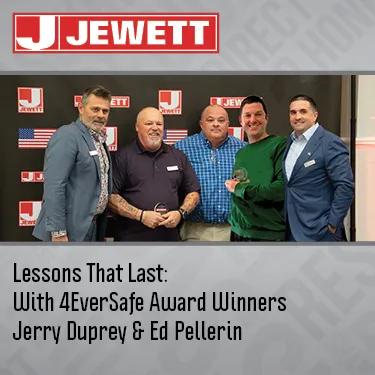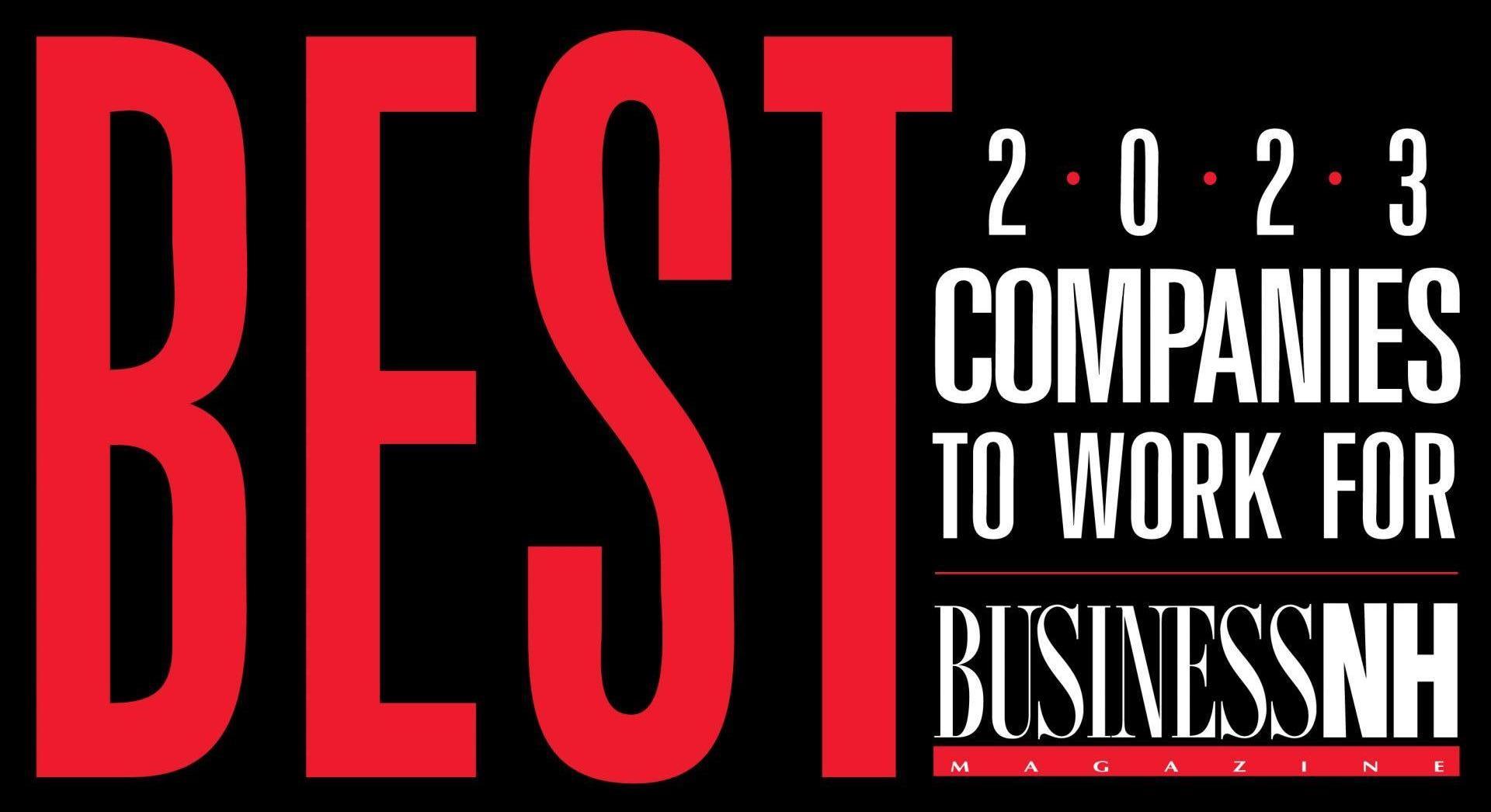Lessons That Last: With 4Eversafe Award Winners Jerry Duprey & Ed Pellerin
May 5th, 2025
Lessons That Last: With 4Eversafe Award Winners Jerry Duprey & Ed Pellerin | 5/5/25

At Jewett Construction, safety is more than a checklist — it is a core value that shapes how we operate, lead, and build. In honor of Construction Safety Week, I sat down for a conversation with two of our most respected Senior Superintendents, Jerry Duprey and Ed Pellerin. Both are Jewett 4EverSafe Award winners, a recognition reserved for those who model and champion safety in everything they do. Over the course of their careers, these two have seen safety culture evolve dramatically — and they’ve been shaping it every step of the way. Here’s what they had to say.
"Safety Is an Everyday Concept"
Sarah: What’s one safety lesson you learned early in your career that still sticks with you today?
Ed: I’ll start! The biggest lesson that stuck with me is that safety is an everyday mindset. You don’t get to pick and choose when to be safe. Every time you step onto a site, you have to think about the people around you — because we all have families. Our job is to make sure every single person walks off that jobsite and back to their families the same way they walked in. No injuries. That’s non-negotiable.
Jerry: I agree 100%. I made it my rule that as soon as I walk out of the trailer, it’s 100%about safety. If something takes longer to do safely, so be it. There are no shortcuts. I don’t allow anyone to take chances on my sites — you follow the protocol, or you don’t work on my site. It’s that simple.
Ed: One of the best pieces of advice I ever got was: Never ask someone to do something you wouldn’t do yourself. If something looks sketchy, it probably is. Don’t do it. Find a safer way.
From Gut Instinct to Protocol: Construction Safety Evolution
Sarah: How has the culture of safety changed since you first started, and how have you helped shape that change?
Jerry: Oh, it’s changed dramatically. 30+ years ago, we were walking on steel three stories up with no harness. We never wore safety glasses. You’d jump in a 10-foot trench without thinking. Today, you’d get cited for that. Back then, the attitude was “just get it done.” Since then, regulations have gotten stronger and stronger, and attitudes started to change. Now, safety comes first — as it should. Sure, it might take a little longer to do something now as opposed to 30 years ago, but you get to keep your fingers!
Ed: (laughing) I’m not quite as old as Jerry, but I’ve seen a shift too. Technology has become a big part of the equation. We’re using tools like drones to survey a site before anyone sets foot on it. That kind of proactive approach helps us identify potential hazards early and make better decisions. Thinking outside the box and using the technology available makes us better prepared — and ultimately, safer. I started with hospital construction, so I’ve always been around strict safety. But even then, the standards and documentation requirements have gotten more robust. Today, there’s no “looking the other way.” It’s all about accountability.
Jerry: And it should be! We’ve all seen or heard about the old days — I once worked with a guy whose 80-year-old father would drink two beers at lunch and then go back to the job. Every. Single. Day.
Ed: That was the thing back then — crazy!
Moments That Change Everything
Sarah: Can you tell us about a time when speaking up or taking action made a difference?
Ed: Early in my career, I was on a hospital site and noticed high winds were in the forecast over the weekend. We had a 250-ton crane on-site. I told the operator to lower the lattice boom. They brushed it off and insisted they had it covered. I raised my concern with the subcontractor again, but the operator, being a seasoned union worker, had me second-guessing my concern, and I deferred to his expertise when he said that he had a plan for the crane. Still feeling uneasy, I documented my concerns and conversations. Well, the wind hit, and the crane toppled, crushing three buildings — including two houses. Miraculously, no one was hurt, thank God. I wish that, early in my career, I had the confidence to keep pushing back on that crane operator, despite his years of experience. But my note in the daily log about raising the issue? That saved my company millions in liability. Documentation matters.
Jerry: Mine’s more personal. About 25 years ago, I fell 35 feet off a roof. I was carrying things in both hands, missed the top rung of the ladder, and went down — even landed on a coworker before hitting the ground. I was lucky to have survived. I spent a few days in the hospital and lost over a month of work. Since then, I’ve been militant about ladder safety. Ladders get tied off. Three points of contact. No exceptions. That fall changed everything for me.
Wearing the 4EverSafe Badge with Pride
Sarah: What does it mean to you to be a 4EverSafe Award winner?
Jerry: It means I’m doing my job. Safety comes first — then the work. I joined the Safety Committee because I wanted to walk the walk, not just talk about it.
Ed: Same here. It’s a badge of pride. It tells me I’m doing right by my crews and that I care enough to make sure everyone goes home safely. We also use it as a chance to mentor the next generation. We walk jobs with the younger supers and ask, “What do you see here?” It’s about building awareness and confidence.
Instilling a Safety-First Culture
Sarah: How do you build that safety mindset with your teams?
Jerry: I tell my teams: If something feels off, say something. Come to me. Let’s talk to the foreman. Have the five-minute conversation. We’ll figure out the safe way, and that’s the only way we do it. Younger supers are focused on building, but they need to understand: If your building gets built but someone gets seriously hurt, that’s not a win — that’s a failure.
Ed: I just tell them to look around. If something looks messed up, it probably is. That awareness — that’s step one.
Sarah: I really believe leadership sets the tone. By taking safety seriously, you’re creating a culture that newer team members will carry forward. That’s an incredibly powerful legacy to leave behind.
Jerry and Ed: (Humble chuckles)
"It Has to Be Drilled in Every Day"
Sarah: What message do you hope sticks with the next generation of builders?
Ed: Set the tone from Day 1. I’m pretty strict at first — it sets expectations. Eventually, they understand that it’s about care. Care about your people. Be observant. Know when someone’s having an off day. I call it “keeping the pulse of your job”. You need to be tuned into your crew and recognize when distractions might become risks. Everyone’s got personal stuff going on, and sometimes that stuff comes to work with them – it’s human. But those distractions can lead to accidents. So, check in, have a real conversation, let them know you care, and help them refocus. That’s how you keep people safe.
Jerry: It’s all about consistency. Make safety your priority from Day 1. Use all your toolbox talks and all the education you can give your crew. CRM [Construction Risk Management, Inc.] really helps keep us focused as well. I want everyone to know that there is no arguing about safety. Minor things, like their safety glasses fell off— sure, we handle them – we make sure they put the glasses back on - easy. Things happen. But major violations? You’re off the site. I document everything. Because in the end, we’re here to protect lives, not just build buildings. Safety isn’t a suggestion — it’s the foundation.
Closing: Building Safely, Building Better
At Jewett Construction, safety is not a checkbox — it’s a culture. It lives in the conversations between teammates, in the decisions made under pressure, and in the example set by leaders like Jerry and Ed. As we celebrate Construction Safety Week, we recognize that safety is not just a policy — it’s a legacy we pass from one builder to the next.
Whether it’s tying off ladders, documenting wind warnings, or taking the time for a five-minute jobsite chat, our team is committed to ensuring that every worker goes home safe — every single day. That’s the Jewett way.

About Jewett: Jewett Construction Company is a full-service commercial construction company, design-builder, general contractor, and commercial construction manager with projects across the East Coast.
Jewett Construction through its licensed division Jewett Design LLC. (“Jewett”) provides architectural services.








